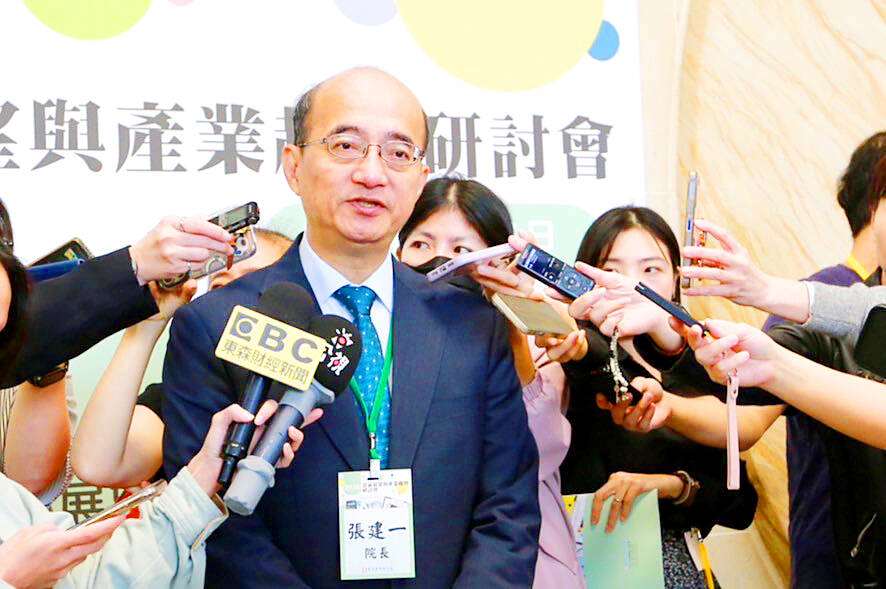Two more institutes have sharply raised their GDP growth forecasts for Taiwan this year, after the economy delivered a much stronger-than-expected performance in the third quarter, driven almost entirely by booming demand for artificial intelligence (AI)–related products.
The upward revisions underscore how Taiwan’s AI supply chain has become the dominant force behind its economic expansion, offsetting persistent weakness in traditional sectors.
The Taiwan Institute of Economic Research (TIER, 台經院) yesterday raised its growth estimate from 3.02 percent to 5.94 percent, two days after UBS Investment Bank revised up its projection from 5 percent to 6.5 percent.

Photo: Liao Chia-ning, Taipei Times
The AI-led surge in semiconductors, servers and related equipment has fueled exports and private investment this year, TIER president Chang Chien-yi (張建一) said.
In contrast, traditional sectors such as textiles, petrochemicals and steel have remained sluggish amid weak overseas demand and competition from low-priced Chinese goods.
Taiwan’s economy expanded 7.1 percent in the first three quarters, supported by a 30 percent year-on-year jump in outbound shipments — the strongest growth in Asia.
That momentum would allow Taiwan to achieve nearly 6 percent annual growth even if GDP growth moderates this quarter, Chang said.
However, major technology firms issued upbeat guidance for the final quarter — the peak season for electronics.
US cloud service providers are ramping up investment in AI infrastructure, while Apple Inc expects double-digit percentage growth in sales of its latest iPhones during the holiday season — trends that could further benefit Taiwanese suppliers across global supply chains and set the stage for more upside surprises.
Shipments of automatic data processing machines and parts, excluding portables, accounted for about two-thirds of Taiwan’s export growth this year, UBS senior economist for Asia and China William Deng (鄧維慎) said in a report.
The surge reflects Taiwan’s dominant role in graphics processing units, AI servers and component manufacturing, he added.
TIER and UBS observed a marked upswing in tech industrial production, while non-tech output has remained flat.
Traditional industries should perform better next year as early signs of a recovery emerge, although AI-related exports would remain the main growth driver, albeit at a slower pace, Chang said.
However, private consumption has been underwhelming. To bolster spending, the government would launch a cash handout program offering NT$10,000 per person starting next week through April next year.
The stimulus could lift overall GDP growth by 0.3 to 0.4 percentage points, Chang said.
TIER expects Taiwan’s GDP growth to moderate to 2.6 percent next year, while UBS projects a 3.3 percent rise, both citing a higher comparison base.
Even so, Taiwan’s economic performance this year ranks among the best in Asia — trailing only Vietnam and India, yet far outpacing more developed peers such as South Korea, Singapore and Japan, UBS said.

CALL FOR SUPPORT: President William Lai called on lawmakers across party lines to ensure the livelihood of Taiwanese and that national security is protected President William Lai (賴清德) yesterday called for bipartisan support for Taiwan’s investment in self-defense capabilities at the christening and launch of two coast guard vessels at CSBC Corp, Taiwan’s (台灣國際造船) shipyard in Kaohsiung. The Taipei (台北) is the fourth and final ship of the Chiayi-class offshore patrol vessels, and the Siraya (西拉雅) is the Coast Guard Administration’s (CGA) first-ever ocean patrol vessel, the government said. The Taipei is the fourth and final ship of the Chiayi-class offshore patrol vessels with a displacement of about 4,000 tonnes, Lai said. This ship class was ordered as a result of former president Tsai Ing-wen’s (蔡英文) 2018

‘SECRETS’: While saying China would not attack during his presidency, Donald Trump declined to say how Washington would respond if Beijing were to take military action US President Donald Trump said that China would not take military action against Taiwan while he is president, as the Chinese leaders “know the consequences.” Trump made the statement during an interview on CBS’ 60 Minutes program that aired on Sunday, a few days after his meeting with Chinese President Xi Jinping (習近平) in South Korea. “He [Xi] has openly said, and his people have openly said at meetings, ‘we would never do anything while President Trump is president,’ because they know the consequences,” Trump said in the interview. However, he repeatedly declined to say exactly how Washington would respond in

WARFARE: All sectors of society should recognize, unite, and collectively resist and condemn Beijing’s cross-border suppression, MAC Minister Chiu Chui-cheng said The number of Taiwanese detained because of legal affairs by Chinese authorities has tripled this year, as Beijing intensified its intimidation and division of Taiwanese by combining lawfare and cognitive warfare, the Mainland Affairs Council (MAC) said yesterday. MAC Minister Chiu Chui-cheng (邱垂正) made the statement in response to questions by Democratic Progressive Party (DPP) Legislator Puma Shen (沈柏洋) about the government’s response to counter Chinese public opinion warfare, lawfare and psychological warfare. Shen said he is also being investigated by China for promoting “Taiwanese independence.” He was referring to a report published on Tuesday last week by China’s state-run Xinhua news agency,

‘NOT SUBORDINATE’: Only Taiwanese can decide the nation’s future, and people preserving their democratic way of life is not a provocation, President William Lai said Taiwan does not want China’s “one country, two systems,” and must uphold its freedom and democracy as well as resolve to defend itself, President William Lai (賴清德) said yesterday, rejecting Beijing’s latest bid to bring the country under Chinese control. The president made the remarks while attending a commissioning ceremony for Taiwan’s first battalion of M1A2T Abrams tanks in Hsinchu County’s Hukou Township (湖口). The tanks are made by General Dynamics, a major US defense contractor. China this week said it “absolutely will not” rule out using force over Taiwan, striking a much tougher tone than a series of articles in state media